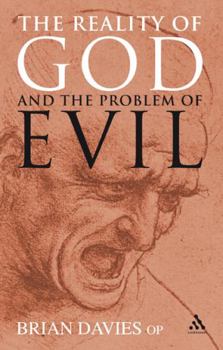The Reality of God and the Problem of Evil
An important new book on how we can still believe in a God of love and confront the problem of evil in the world. Probably the most important book on the subject since John Hick's book Evil and the God of Love .
Format:Paperback
Language:English
ISBN:082649241X
ISBN13:9780826492418
Release Date:December 2006
Publisher:Continuum
Length:272 Pages
Weight:0.80 lbs.
Dimensions:0.8" x 6.0" x 8.2"
Customer Reviews
2 ratings
A God To Ignore
Published by Thriftbooks.com User , 14 years ago
Imagine this scenario: A little girl is cruelly abused by her parents. Psychologically scarred, she grows up to be a drug addict and prostitute. Because she takes drugs while pregnant, she gives birth to a blind and retarded baby. Question: How could a good God allow this? Why did he create a world where innocent babies are born blind and retarded? Isn't this evidence that God doesn't exist, or, if He does, that He isn't good or all-powerful? Fr. Davies has an answer to this challenge. It turns on the notion of positive existence. All positive existence flows from God. However, evil does not have positive existence. It is the lack of something. Cruelty is the lack of a good character. Addiction is the lack of will power. Blindness is the lack of eyesight. Mental retardation is the lack of intelligence. The upshot: Since evil doesn't have positive existence, it wasn't created by God. God bears no causal responsiblity for the chain of suffering that leads to a handicapped baby. God is off the hook. Fr. Davies takes seriously the idea that God is the unable-not-to-exist source of contingent existence -- and not much more. As the source of being, God is good. However, He is not a person nor is He bound by moral rules. He isn't required to minimize the pain in the world. And while He must be posited to explain the existence of contingent things, He is more mysterious than anything He's invoked to explain. If you buy this line of reasoning, you'll love "The Reality of God and the Problem of Evil." The book is clearly-written. It rejects attempts to anthropomorphize God. It is a worthy example of Thomist philosophizing. It also does a great job of making theism and Christianity seem unattractive and irrelevant to human concerns. Who needs a God like this?
The reality of evil IS a problem for god
Published by Thriftbooks.com User , 15 years ago
Brian Davies leads us to expect that he has an answer to the basic problem of evil in the Christian conception of an all knowing, all powerful, and all benevolent god. The very fact that evil exists is a strong, if not irrefutable argument that the creator of all universe cannot be at once all powerful and all good. However, reading through to the end, one wonders what point Davies has succeeded in making except that the problem has not been solved. It appears that having very articulately drawn up all the arguments by atheists such as Hume and pointing out the strength and persuasiveness of these arguments, and also bringing up the standard defences of Christian apologists such as Aquinas and Plantinga, Davies was at last about to deliver the punch line. He didn't. His conclusion seems to be that there is nothing we can do about evil. It exists, but it does not mean that it proves that God therefore does not. Davies says that we cannot judge God by the moral standards we judge ourselves. That seemed to be a weak argument because there is no other standard by which we judge whether any god was good or bad. We cannot say that a god is good by applying a tandard of good that we do not understand. It seems that ultimately, Davies had fallen back on an old theistic defence - we are in no position to understand God's reasons. The number of qualifications and emphasis he made to distance himself from some of his own strongest arguments only made his own position even more difficult to understand. However, to say that in the end, he had not explicated a clear and persuasive position that the problem of evil resonates against the concept of a good and powerful god, is not to say (using Davies' favourite phrase) that the book is not worth reading. The arguments that he takes us through were all cogent and coherent. Only his conclusions weren't. The book is worth reading just for the arguments. The reader can form his own conclusions.






